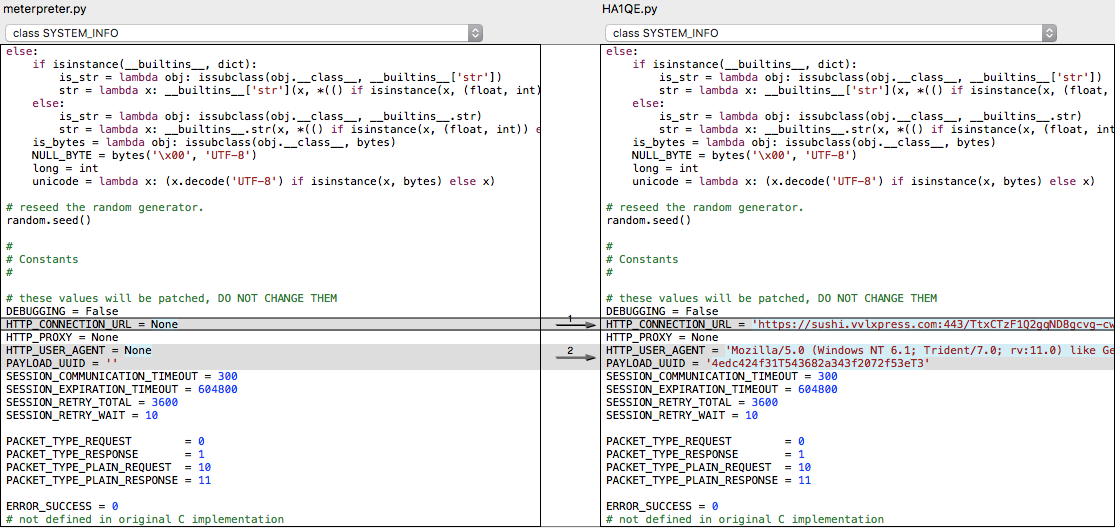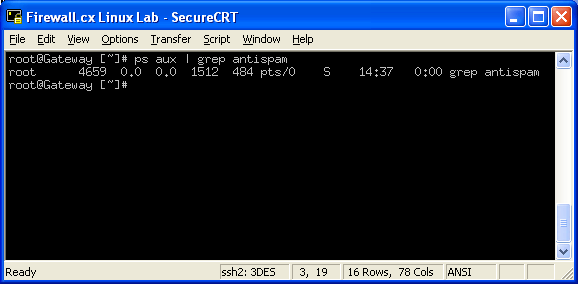Ps Grep Little Snitch Grep Grep
Dec 19, 2017 /bin/sh -c ps -ef grep Little Snitch grep -v grep Response: In the event that this alert fires, the following response procedures are recommended: Look at management tooling to identify if. Mac OS X Command Line 101 by Richard Burton. Grep allows you to search through your entire system, for either the name of a file, or for content within those files. This is similar to the way.
Detect attempts by potentially malicious software to discover the presence of Little Snitch on a host by looking for process and command line artifacts.
These attempts are categorized as Discovery / Security Software Discovery.
The strategy will function as follows:
- Record process and process command line information for MacOS hosts using endpoint detection tooling.
- Look for any explicit process or command line references to Little Snitch.
- Suppress known-good processes and command line arguments
- Little Snitch Updater
- Little Snitch Installer
- Health checks for Little Snitch
- Fire alert on any other process or command line activity.
Little Snitch is an application firewall for MacOS that allows users to generate rulesets around how applications can communicate on the network. Cubase drum vst download free.
In the most paranoid mode, Little Snitch will launch a pop-up notifying the user that an application has deviated from a ruleset. For instance, the following events could trip an interactive alert:
A new process is observed attempting to communicate on the network.A process is communicating with a new IP address or port which differs from a ruleset.The following prompt demonstrates the expected behavior of Little Snitch:
Due to the intrusive nature of Little Snitch popups, several MacOS implants will perform explicit checks for processes, kexts, and other components. This usually manifests through explicit calls to the process (ps) or directory (dir) commands with sub-filtering for Little Snitch.
For instance, an implant could look for the following components:
- Running Little Snitch processes
- Little Snitch Kexts
- Little Snitch Plists
- Little Snitch Rules
The following code is explicitly run by the Powershell Empyre agent as soon as it executes on a MacOS system:
The following screenshot shows the same command as part of a endpoint detection tooling process execution chain:
Looking at the source code for Powershell Empyre reveals the explicit check using the ps and grep commands:
This strategy relies on the following assumptions:
- Endpoint detection tooling is running and functioning correctly on the system.
- Process execution events are being recorded.
- Logs from endpoint detection tooling are reported to the server.
- Endpoint detection tooling is correctly forwarding logs to SIEM.
- SIEM is successfully indexing endpoint detection tooling logs.
- Attacker toolkits will perform searches to identify if Little Snitch is installed or running.
A blind spot will occur if any of the assumptions are violated. For instance, the following would not trip the alert:
- Endpoint detection tooling is tampered with or disabled.
- The attacker implant does not perform searches for Little Snitch in a manner that generates a child process.
- Obfuscation occurs in the search for Little Snitch which defeats our regex.
There are several instances where false positives for this ADS could occur:
- Users explicitly performing interrogation of the Little Snitch installation
- Grepping for a process, searching for files.
- Little Snitch performing an update, installation, or uninstallation.
- We miss whitelisting a known-good process.
- Management tools performing actions on Little Snitch.
- We miss whitelisting a known-good process.

Known false positives include:
- Little Snitch Software Updater
Most false positives can be attributed to scripts or user behavior looking at the current state of Little Snitch. These are either trusted binaries (e.g. our management tools) or are definitively benign user behavior (e.g. the processes performing interrogation are child processes of a user shell process).
The priority is set to medium under all conditions.
Validation can occur for this ADS by performing the following execution on a MacOS host:
In the event that this alert fires, the following response procedures are recommended:
- Look at management tooling to identify if Little Snitch is installed on the host.
- If Little Snitch is not installed on the Host, this may be more suspicious.
- Look at the process that triggered this alert. Walk the process chain.
- What process triggered this alert?
- What was the user the process ran as?
- What was the parent process?
- Are there any unusual discrepancies in this chain?
- Look at the process that triggered this alert. Inspect the binary.
- Is this a shell process?
- Is the process digitally signed?
- Is the parent process digitally signed?
- How prevalent is this binary?
- Does this appear to be user-generated in nature?
- Is this running in a long-running shell?
- Are there other indicators this was manually typed by a user?
- If the activity may have been user-generated, reach out to the user via our chat client and ask them to clarify their behavior.
- If the user is unaware of this behavior, escalate to a security incident.
- If the process behavior seems unusual, or if Little Snitch is not installed, escalate to a security incident.
English[edit]
Etymology[edit]
From an idiomatic command sequence in the qed and ed text editors: ‘g/re/p’, meaning: globally search for a regular expression and print.
Pronunciation[edit]
- (UK)IPA(key): /ɡɹɛp/
- Rhymes: -ɛp
Proper noun[edit]
grep
- A program which selects lines in a file which match a given pattern.
Verb[edit]
grep (third-person singular simple presentgreps, present participlegrepping, simple past and past participlegrepped)
- To use a program such as grep to search in a file.
- By extension, to search anything (perhaps a paper document by eye).
Derived terms[edit]
Translations[edit]
|
|
|
Further reading[edit]
- “grep” in Eric S[teven] Raymond, editor, The Jargon File, version 4.4.7, 29 December 2003.
Anagrams[edit]
Albanian[edit]
Alternative forms[edit]
- grap, gërepë, gërjepë
Etymology[edit]
From Proto-Indo-European*grep-(“hook”), from *gremb-(“crooked, uneven”), ultimately from *ger-(“to turn, bend, twist”) (cf. Englishgrapple, Old Frenchgrape, grappe, crape(“hook”), Norwegiangrep(“grasp”)). Alternatively a contraction of variant gërepë, from archaic and dialectal gërjepë, from Proto-Albanian*ga-repa, from *repa(“to peel, tear off”) (modern rrjep). More at rrjep.[1]
Noun[edit]
grepm
- hook, fishhook
Derived terms[edit]
- grremç, gërrefshë, gërraç
Related terms[edit]
References[edit]
- ^ Orel, Vladimir (1998), “grep”, in Albanian Etymological Dictionary, Leiden, Boston, Cologne: Brill, page 123
Japanese[edit]
Etymology[edit]
Borrowed from Englishgrep.
Pronunciation[edit]
- IPA(key): [ɡɯ̟ᵝɾe̞p̚pɯ̟ᵝ]
Noun[edit]
grep• (gureppu)
Verb[edit]
grepする• (gureppu suru) suru (stemgrepし(gureppu shi), pastgrepした(gureppu shita))
- to grep
Conjugation[edit]
| Stem forms | ||||
|---|---|---|---|---|
| Imperfective (未然形) | grepし | グレップし | gureppu shi | |
| Continuative (連用形) | grepし | グレップし | gureppu shi | |
| Terminal (終止形) | grepする | グレップする | gureppu suru | |
| Attributive (連体形) | grepする | グレップする | gureppu suru | |
| Hypothetical (仮定形) | grepすれ | グレップすれ | gureppu sure | |
| Imperative (命令形) | grepせよ¹ grepしろ² | グレップせよ¹ グレップしろ² | gureppu seyo¹ gureppu shiro² | |
| Key constructions | ||||
| Passive | grepされる | グレップされる | gureppu sareru | |
| Causative | grepさせる grepさす | グレップさせる グレップさす | gureppu saseru gureppu sasu | |
| Potential | grepできる | グレップできる | gureppu dekiru | |
| Volitional | grepしよう | グレップしよう | gureppu shiyō | |
| Negative | grepしない | グレップしない | gureppu shinai | |
| Negative continuative | grepせず | グレップせず | gureppu sezu | |
| Formal | grepします | グレップします | gureppu shimasu | |
| Perfective | grepした | グレップした | gureppu shita | |
| Conjunctive | grepして | グレップして | gureppu shite | |
| Hypothetical conditional | grepすれば | グレップすれば | gureppu sureba | |
| ¹ Written imperative ² Spoken imperative | ||||
Norwegian Bokmål[edit]
Etymology 1[edit]

From the verb gripe
Noun[edit]
grepn (definite singulargrepet, indefinite pluralgrep, definite pluralgrepaorgrepene)
- a grasp, grip.
Etymology 2[edit]
Alternative forms[edit]
Verb[edit]
grep
Ps Grep Little Snitch Grep Grep 1
- simple past of gripe.
References[edit]
- “grep” in The Bokmål Dictionary.
Norwegian Nynorsk[edit]
Etymology[edit]
From the verb gripe
Noun[edit]
grepn (definite singulargrepet, indefinite pluralgrep, definite pluralgrepa)
- a grasp, grip.
References[edit]
- “grep” in The Nynorsk Dictionary.
Swedish[edit]
Etymology[edit]
From Old Norsegreip, from Proto-Germanic*graipō.
Pronunciation[edit]
Ps Grep Little Snitch Grep Grep Number
- IPA(key): /ɡreːp/
Audio
Noun[edit]
grepc
- garden fork, graip – a tool, resembling a pitchfork but where both handle and prongs are shorter and sturdier, and which is used more for digging than lifting
Declension[edit]
| Declension of grep | ||||
|---|---|---|---|---|
| Singular | Plural | |||
| Indefinite | Definite | Indefinite | Definite | |
| Nominative | grep | grepen | grepar | greparna |
| Genitive | greps | grepens | grepars | greparnas |
Verb[edit]
Download david cook always be my baby free. grep
- past tense of gripa.



